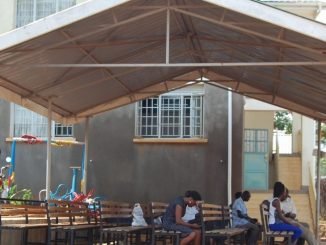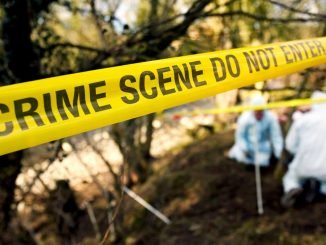
Kampala, Uganda | URN | Journalists on Monday 28, December 2020 walked out on a security press conference at the Uganda Media Centre to protest against the continued police brutality against their colleagues.
The journalists who had turned up to cover the Monday presser tasked the chief political commissar of the Uganda People’s Defence Forces [UPDF] Maj. Gen. Henry Masiko to apologize for the brutality meted out against journalists by security personnel.
The walk-out followed Sunday’s incident in Masaka where three journalists were injured while covering National Unity Platform [NUP] presidential candidate Robert Kyagulanyi Ssentamu campaigns. They include Ashraf Kasirye who works for Ghetto TV, Ali Mivule of NTV and Daniel Lutaaya of NBS TV.
Masiko who was briefing the press on the celebrations to mark the UPDF’s 40th Tarehesita celebrations was surprised when he saw the journalists walk out of the briefing. Moments after they walked out, more than 40 police officers and Local Defense Unit [LDU] personnel were seen deployed outside the Uganda Media Centre.

Daily Monitor’s Gabriel Buule said that he was brutalized by security personnel and is still nursing the injuries to date.
“Our uniforms we pay for? For sure we love you so much, this force, but we are tired. Fellow journalists, we did not get an apology from our officer. Let us walk away for once and for all. We shall come back, let us stand in solidarity and we go. We’re beaten, I couldn’t provide for my child. Am a freelance journalist, let us walk away. Pick your cameras and walk, walk…walk,” Buule said.
Masiko called on professionalism from both sides of security and media. He also warned journalists against being activists and being partisan. Charles Mugerwa, a journalist with CBS radio says that journalists should stand up for their rights.
“No, we cannot tolerate this anymore. No. No. If media Maj Gen. cannot answer our questions, if you cannot respond to our concern, then take it back to your bosses. We’re tired of this. I am a leader, I cannot keep quiet when my people are beaten. Whether you work for Ghetto TV whether you work for what, you’re a journalist,” said Mugerwa.
Abubaker Lubowa, a photojournalist with Daily Monitor demanded the arrest of all the officers involved in brutalizing the journalists.
“You can’t protect us when we go out there to work, its about protection. The Tarehesita you’re launching right now, the first bullet was shot to bring peace to the people of Uganda. There is freedom for media, and if media can’t express itself then why should we keep celebrating Tarehesita. We’re the people who publicize this and we’re beaten.
Now what we’re demanding for, we want the security agencies, not the only police, of course, they have issued other statements but we want you to be on record. We have always been demonstrating, walking to police and as we’re walking for freedom of the media still we’re beaten,” said Lubowa.
Read Also: Media Council of Uganda issues ultimatum to journalists to register ahead of 2021 polls
Flavia Byekwaso, the UPDF spokesperson said that the heavy deployment at the Media Centre was necessary after they received information that the journalists were planning to attack the spokespersons of the different security agencies.
“Like you have seen on your social media forums that you journalists were saying – what you’re saying you know it – what you’re saying. So these guys actually thought that you’re under a problem. They came as a rescue team and you saw me come out to tell them that no, there is no problem,” said Byekwaso.
Meanwhile, the Uganda Parliamentary Press Association (UPPA) has also condemned the brutality of journalists. UPPA president Moses Mulondo labelled the Inspector General of Police Okoth Ochola an enemy of press freedom and human rights.



